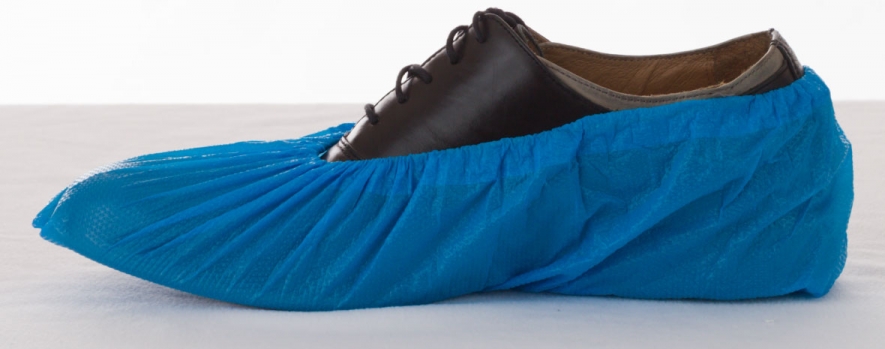
Shoe covers are common items of personal protective equipment (PPE) within the medical, cleanroom, chemical, industrial, laboratory, and emergency environments. Such environments often require shoe covers as part of standard PPE protocols.
But what about environments in which shoe covers aren't mandated by industry or facility standards, such as contracting work? Consider these five reasons why shoe covers remain a valuable piece of PPE attire even for contractors such as carpentry, cable installation, HVAC installers, electricians, plumbers, and more.
What Are Shoe Covers?
Shoe covers are disposable slip-on garments that fit snugly over a variety of shoe style and sizes. They prevent potentially hazardous material (including organic and chemical particles) from coming in contact with the bottom of a person's shoes.
Look for the following features in quality shoe covers:
- Easy to don and doff (Put on and take off)
- Secure yet flexible elastic bands around the ankles to avoid slipping
- Durable yet breathable fabric that won't tear or snag, while still providing adequate liquid and particulate protection
- Material which will meet the standards of industry work flow practices (e.g., sterile packaging and appropriate sterility assurance level)
- Non-slip and sturdy soles which improve tracking and reduce the risk of slips and falls
When you may need Shoe Covers
- Seasonal challenges. In the thick of winter or spring when salt, slow, sludge, and water are commonly tracked around by footwear, shoe covers can be exceptionally helpful at cutting down on mess.
- Private contracting jobs. Electricians, plumbers, cable installers, renovators, bug exterminators, and many other contractors use these inside customers' homes to ensure their clients' homes remain as clean as possible as they do their work.
- Medical and industrial jobs. Shoe covers are worn often in emergency rooms, operating theaters, laboratories, and cleanrooms. Additionally, when some patients come into the hospital with highly contagious bugs or infections, anyone who enters their private room (whether it's staff or family) may be required to wear shoe covers along with additional PPE such as disposable gloves, gowns, and masks.
- Public use. It may be surprising to know that many laypeople find ways to use shoe covers in their day-to-day-lives. For instance, some people prefer to cover their feet in a tanning bed or protect their shoes during inclement weather.
5 Benefits of Wearing Shoe Covers
Wondering if your workplace should initiate the use of shoe covers? Consider these five reasons why your organization may benefit:
- Reduces the spread of contamination. Disposable shoe covers can be simply thrown away after leaving a work environment. This drastically reduces the risk of cross-contamination and prevents employees from tracking potentially harmful material to other areas of the building or even into the community.
- Helps maintain a cleaner room and environment. Shoe covers prevent tracking of substances around the building or workspace, which could otherwise damage flooring, pose as a fall hazard, or impair the sterility and cleanliness of the rooms. Even the spread of ordinary dirt and grime can be prevented by contractors such as electricians and plumbers when walking in and out of a customer's home with the help of disposable shoe covers.
- Helps keep shoes clean. Many jobs require activities which may expose employees to materials which can stain or damage footwear. Since shoe covers provide a physical barrier between these materials, individual footwear remains cleaner...and more professional looking to boot (no pun intended).
- Improves efficiency. Employees wearing shoe covers are less likely to require time away from their required job duties in order to clean or change soiled footwear.
- Improves customer satisfaction. Customers—whether in medical facilities, office buildings, or private homes—appreciate the attention to detail and level of care and professionalism shown by personnel who choose to use shoe covers. Many customers have specific personal, health, or religious reasons against the presence of shoes in the home, and shoe covers offer a reasonable alternative when it's not safe or appropriate for personnel to remove their footwear. Additionally, customers will appreciate the improved cleanliness which shoe covers provide, and likely feel more comfortable and safe in the given environment.
Conclusion
While they may look strange, shoe covers are valuable pieces of PPE that are better for customers, employees, and the home or work environment. If you're ready to explore the use of shoe covers in your business, contact International Enviroguard today to learn more about our range of disposable shoe cover products. Call us toll free at 1-800-345-5972.
